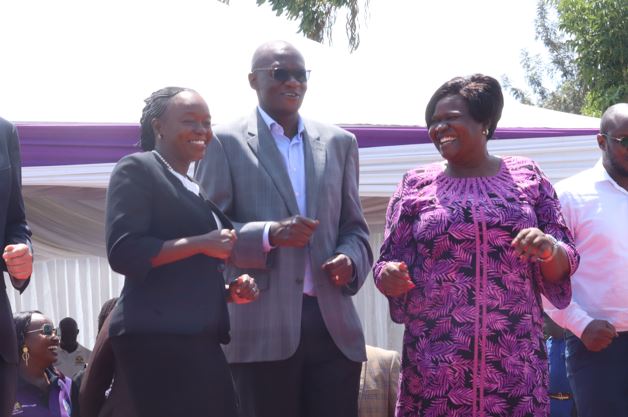
The government has rolled out guidelines for comprehensive newborn care in a bid to reduce neonatal deaths.
Health Cabinet Secretary Deborah Barasa said the newborn care training package was meant to give healthcare workers skills on how to take care of newborns.
The Cabinet Secretary, who was accompanied by Health Director General Patrick Amoth and Governor Gladys Wanga, launched the guidelines at Homa Bay Kenya Medical Training College grounds on Monday.
The launch was done during the celebration to mark World Prematurity Day to raise awareness of premature birth.
Dr Barasa said prematurity is the leading cause of death of children under the age of five years worldwide.
According to the Ministry of Health, every baby born before the completion of 37 weeks of pregnancy is considered preterm.
Dr Barasa said preterm birth complications could be prevented, although it was the leading cause of death among children under five years in the country.
She called for innovative solutions to reduce the number of babies who die during birth adding that the majority of the deaths could be prevented.
According to the Ministry of Health, 12 per cent of all live births annually are preterm.
Dr Barasa said prematurity was also the leading cause of neonatal deaths in the country with the Kenya Demographic and Health Surrey report indicating a neonatal mortality rate of 21 per 1000 live births.
The CS said neonatal deaths accounted for 51 per cent of under-five mortality in the country yet many of these were avoidable through proven cost-effective intervention.
She emphasized the importance of breast milk and as well as respiratory support through use of machines such as CPAP, caffeine citrate, and the provision of oxygen when needed.
During the launch, the Ministry also distributed Cpap machines for babies to help those with breathing complications after birth.
“We have equally improved monitoring of newborn care indicators through the development of standardised data collection and monitoring in all admitting facilities,” Dr Barasa said.
Dr Amoth said the country should put in more effort to reduce the number of children who die during birth.
He said it was regrettable that Homa Bay was one of the counties leading in neonatal deaths at 26 per 1000 live births.
The Director General, however, observed that the county has made progress in addressing malnutrition and other underlying factors that promote child deaths.
He noted that 89 per cent of mothers in the county delivered in health facilities against the national average of 90 per cent and that a quarter of births in the county were of teenage mothers.
“Teenage mothers are at risk of dying during childbirth as well as their children dying in the process,” the health director said.
Governor Wanga said there was a need to provide quality care to preterm babies.
According to Governor Wanga, the county has increased access to maternal and newborn health care by strengthening primary health care systems.
Wanga announced that her administration intends to build two specialized neonatal clinics by 2026 and train more healthcare workers to handle preterm births effectively.
USAID donated more than 1000 Cpap machines which would be taken to different hospitals across the country.










